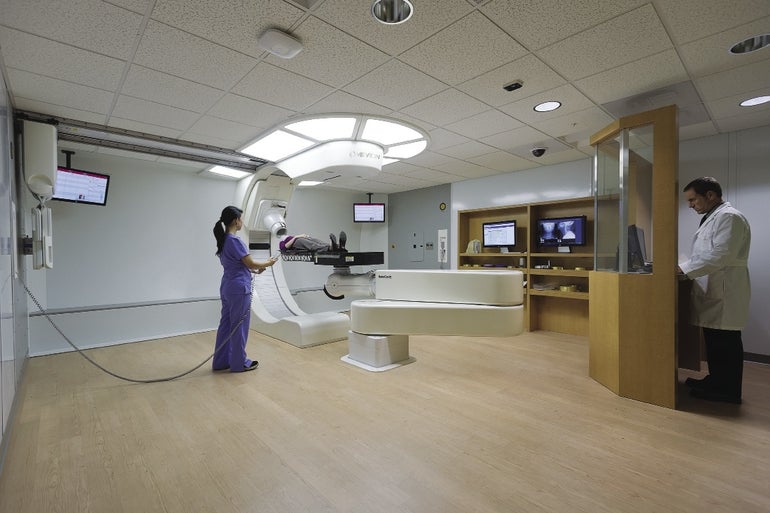In 2007, he met with Still River Systems (renamed Mevion Medical Systems in 2011), to seek to solve the problem. He subsequently saw that the company had signed on several large providers which had the resources to do due diligence before buying, and in 2008, Ackerman Cancer Center signed up with Mevion for an S250 proton therapy device. Delivery, expected in 2011, occurred in 2013, Ackerman said, but the system has since proved its value, he said.
Back in the early 2000s, Dr. Scot Ackerman wanted to offer proton therapy, the oncological silver bullet, to the cancer patients in his private physician practice in Florida. But in those days, there were only two or three proton therapy suppliers – and both the cost and the square footage needed to install a proton therapy treatment were prohibitive, taking up 150 to 200 million square feet with a single cyclotron. Only big hospitals and universities had the space and the funding to acquire a system.
For certain types of cancer — localized, hard to reach, irregularly shaped, and near vital organs — proton therapy is more effective than radiation therapy because its targeted approach spares healthy tissue. The proton beam does not go all the way through the body, but stops at the cancerous site. For breast cancer patients with localized tumors, heart tissue is undamaged, and for brain cancer patients, cognitive function can be spared, Ackerman said.
Ackerman is medical director of Ackerman Cancer Center (ACC), a private-practice oncology physicians’ group in Jacksonville, Fla. “We have two freestanding offices. I looked for a solution that would fit into our office and none existed,” he said.
Mevion Medical Systems, based in Littleton, with international offices in Japan and the United Kingdom, develops and manufactures proton therapy systems. The advantages of its system compared to others is its small footprint, lower cost and lower energy usage than traditional systems, which take up the equivalent of a football field and cost hundreds of millions of dollars. The Mevion system gives clinicians the ability to treat as many patients in three months as bigger systems do in a year. ACC, the first physician-owned practice to install proton therapy, increased its staffing as a result of an increase in patient volume. “We went from a few patients a day to capacity,” Ackerman said, operating from 6 a.m. to 9 p.m. with testing and maintenance done at night.
It’s been a long journey for Mevion, which spent $150 million and many years developing its Littleton manufacturing site, which employs 170 people. The company plans to add another 60 workers over the next year and eventually expand the plant.
Incorporated in 2004, the company didn’t sell its first system until 2011 and installed it in late 2013. The lead time between order placement and a typical delivery timeline is 36 months. Customer purchases are influenced by zoning, determination of need certification, and financial considerations. Each system sold accounts for a significant portion of the company’s revenue and manufacturing capability. In September 2014, the company filed for a $69 million initial public offering, which it subsequently withdrew. The prospectus for the IPO cited $7.6 million in revenue for three months of its fiscal year 2014 and $4.3 million in losses over that time period. The company has incurred losses since its inception and, according to the 2014 prospectus, expects to run a loss through the end of fiscal 2016. Its cumulative losses in fiscal years 2012 through second quarter 2014 totaled $120.5 million.
Years of losses are not unusual for early-stage commercial development companies, particularly those bringing new medical technologies to market. In addition to lengthy sales cycles, new devices require market approval from the Food and Drug Administration, and big customers, such as hospitals, must often obtain a certificate of need from the state agencies that regulate them.
To finance its expansion and ramped-up sales and marketing costs, Mevion recently entered into a joint venture in China through which it expects to secure up to $200 million in financing to support its global commercialization strategy.
“We raised more money in this financing than we likely would have raised in an IPO,” said Joseph K. Jachinowski, Mevion president and CEO. Additionally, the venture opened up the Chinese market, which couldn’t have been done with an IPO, and having partners “very well versed in the nuances” of operating in China presented a big opportunity, according to Jachinowski.
Jachinowski cites increased demand for the product. The company marked the installation of two additional systems this past spring, with three or four more under installation in the U.S.
Another advantage of staying private, he says, is that “you don’t have to continuously disclose the state of your business,” to competitors as well as investors. In addition to eliminating compliance costs, privately held companies can set longer-range goals. “You can undertake projects that might not have an impact on the next quarter.”
Mevion will focus on sales and marketing in China, Jachinowski said. China is at least the second biggest market in the world, and in five years it could outstrip the U.S., he said. Mevion will continue to make core-technology components of the system in Massachusetts rather than overseas. Jachinowski commended the talent and education level of the company’s Massachusetts workforce. Over time, he said, it will add some capacity in China, directed exclusively to supplying the Chinese market, but will manufacture “a large portion” of its China-market systems in the U.S.
“Many leading Chinese institutions in health care are trying to secure the latest U.S. technology to support delivery of health care,” Jachinowski said. “It’s somewhat analogous to how Third World countries skipped past hardwired [telephony] right to wireless.”
What about trade secrets? China is notorious for appropriating intellectual property. “It’s always a concern anywhere,” he said. “We do think having Chinese financial investors helps in that regard because they have a vested interest in Mevion doing well.”

